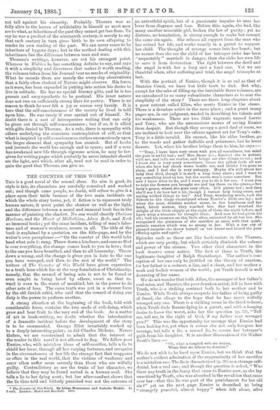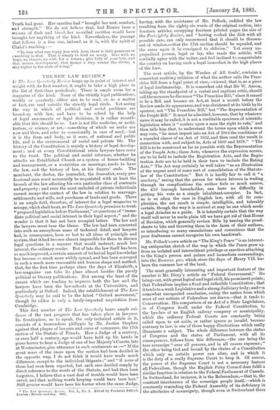THE COUNTER OF THIS WORLD.*
Tuts is a good novel of the second class. Its aim is good, its style is fair, its characters are carefully conceived and worked out; and though some people, no doubt, will refuse to give it a place upon their table because of the two main incidents on which the whole story turns, yet, if fiction is to represent truly human nature, it must paint the shadow as well as the light, and the difference between a moral and immoral book lies in the manner of painting the shadow. No one would classify Clarissa Harlowe, and the Heart of Midlothian, Adam Bede, and Ruth as immoral books ; yet the same incident, telling of man's falseness and of woman's weakness, occurs in all. The title of the book is explained by a quotation on the title-page, and by the writer's own paraphrase :—" On the counter of this world take heed what coin is rung. Throw down a kindness, and sure as God is over everything, the change comes back to you in love ; first to the one you have benefited, and then to all humanity. Throw down a wrong, and the change is given you in bate to the one you have wronged, and then to the rest of the world." The writers of The Counter of this World have given expression to a truth here which lies at the very foundation of Christianity, namely, that the reward of loving acts is not to be found or even sought in being loved by others, sweet as that reward is even to the worst of mankind, but in the power to do other acts of love. The same truth was put in a sterner form by the old Jewish rabbi, who said that the reward of doing one duty is the power to perform another.
A strong situation at the beginning of the book, told with considerable force, contains the two seeds of evil-doing, which grow and bear fruit to the very end of the book. As a matter of art in book-writing, we doubt whether the introduction of a dramatic incident before the development of the story is to be commended. George Eliot invariably worked up to a deeply-interesting point ; so did Charles Dickens. Nevertheless, we are constrained to admit that the interest of the reader in this novel is not allowed to flag. We follow poor Eunice, who, with mistaken ideas of self-sacrifice, tells a lie to shield her lover, through all her varying fortunes, and recognise in the circumstances of her life the strange fact that reappears so often in the real world, that the victims of weakness and error often suffer more severely than those who are wilfully guilty. Contradictory as are the traits of her character, we believe that they may be found united in a human soul. She tells a lie to her dying aunt ; but her after-conduct shows that the lie thus told and bitterly punished was not the outcome of an untruthful spirit, but of a passionate impulse to save her lover from disgrace and loss. Before this, again, she had, like many another miserable girl, broken the law of purity ; yet no distress, no temptation, is strong enough to make her commit the same sin again. She refuses all support from the man who has ruined her life, and works wearily in a garret to support her child. The thought of revenge comes into her heart ; but no sooner does she see the child of her betrayer (who has been " respectably " married) in danger, than she risks her own life to save it from destruction. The fight between the devil and the angel is with her a long and a hard one. Yet we are thankful when, after suffering and trial, the angel triumphs at last.
With the portrait of Eunice, though it is as sad as that of Beatrice Cenci, we have but little fault to find. But why, except for the sake of filling-up the inevitable three volumes, are we introduced to so many subordinate characters as to mar the simplicity of the story ? There are three long chapters about a poor outcast called Ellen, who meets Eunice in the slums. There is a drunken artist in the same place ; and a great many pages are, in our judgment, wasted in describing his talents and his weaknesses. There are two little vagrants named Lorrie and Tony, who are the unconscious means of saving Eunice from despair. But though they occupy a good deal of room, we are inclined to look over the offence against art for Tony's sake. Tony is a little invalid. He cannot, like his older brother, go to the woods and gather daffodils and primroses, but he loves flowers. Yet, when his brother brings them to him, he says :—
" ' Tony, I have been very cross with you all sometimes, but mind the pain is awful bad ; and Mrs. Stone (i.e., Eunice) she is patient with me, and tells me stories, and brings mo nice things to eat; and I know she is very sorry sometimes, 'cause the pillow feels all wet when she lays her cheek down beside me, and thinks I've gone to sleep, and I feel she is very unhappy. Maybe it's Kill about her baby that died, though it is such a long time since; and I want to say something kind to her, but the words won't come somehow. But now I know what to do, and I want you to do it for me. I want you to take the flowers you brought me and lay them on the grave,--her baby's grave, where she goes very often. It'll please her ; and then she'll see I do love her a bit, though I cannot help being cross, and saying wicked things to her.' And Tony, wondering much, took the flowers to the dingy churchyard where Eunice's little one lay ; and when the poor, desolate mother came, in her loneliness and her hard, bitter sorrow, they touched her. She had watched the delight of the little cripple at the sight of them the night before, and knew what a treasure he thought them. And now ho had given his all ; laid his treasure on this little altar, uninvited by all but her. She recognised the greatness of the sacrifice at once, with that quick, artistic emotion which was so strong in her. With a low cry of pleased surprise she threw herself on her knees and kissed the poor offering again and again."
Episodes such as these are like back-waters in the Thames, which are very pretty, but which certainly diminish the volumo. and power of the stream. Two other chief characters in the book deserve some notice. The first of these is Truth, the legitimate daughter of Ralph Stainthorpe. The author's conception of her can only be justified on the theory of atavism, for her father is a seducer, a liar, and a cheat, and her mother a weak and foolish woman of the world ; yet Truth herself is well deserving of her name.
We do not wonder that both Allan, the manager of her father's coal-mine, and Maurice, the poor drunken artist, fell in love with Truth, who is a striking contrast both to her mother and to Eunice. While Truth always suspects her father of being guilty of fraud, she clings to the hope that lie has never wilfully wronged any one. There is a striking scene in the third volume, when Truth finds Eunice dying in a garret, and with a longing desire to know the worst, asks her the question (p. 33), "Tell me, tell me, in the sight of God, if my father ever wronged you ?" This was the opportunity for revenge that Eunice had been looking for, yet when it comes she not only foregoes her revenge, but tells a lie, a second lie, to screen her betrayer's guilt from his daughter. It is another illustration of Sir Walter
Scott's lines :—
" Oh, what a tangled web we weave, When first we labour to deceive."
We do not wish to be hard upon Eunice, but we think that the author's evident admiration of the magnanimity of her sacrifice is a mistaken one. The lie is characterised (p. 36) as a strange selfdenial, but a real one ; and though the question is asked, "Was there any truth in the fancy that came to Eunice now, as she lay unnoticed by Truth, who was absorbed in the revulsion that came over her—that this lie was part of the punishment for her old sin ?" yet on the next page Eunice is described as being "strangely peaceful, almost happy" when left alone, after Truth had gone. Her sacrifice had "brought her rest, comfort, and strength." We do not believe that, had Eunice been a woman of flesh and blood, her so-called sacrifice would have brought her anything of the kind. Nevertheless, the passage that follows is a fine one, imbued, as it is, with the spirit of Christ's teaching :—
" To love what can repay you with love, there is little generous or ennobling in that. That is simply to lend on usury. Give with no hope, no chance, no wish for a return ; give folly of your love, and that means development, that means a step nearer the divine, a step higher in the scale of being."







































 Previous page
Previous page